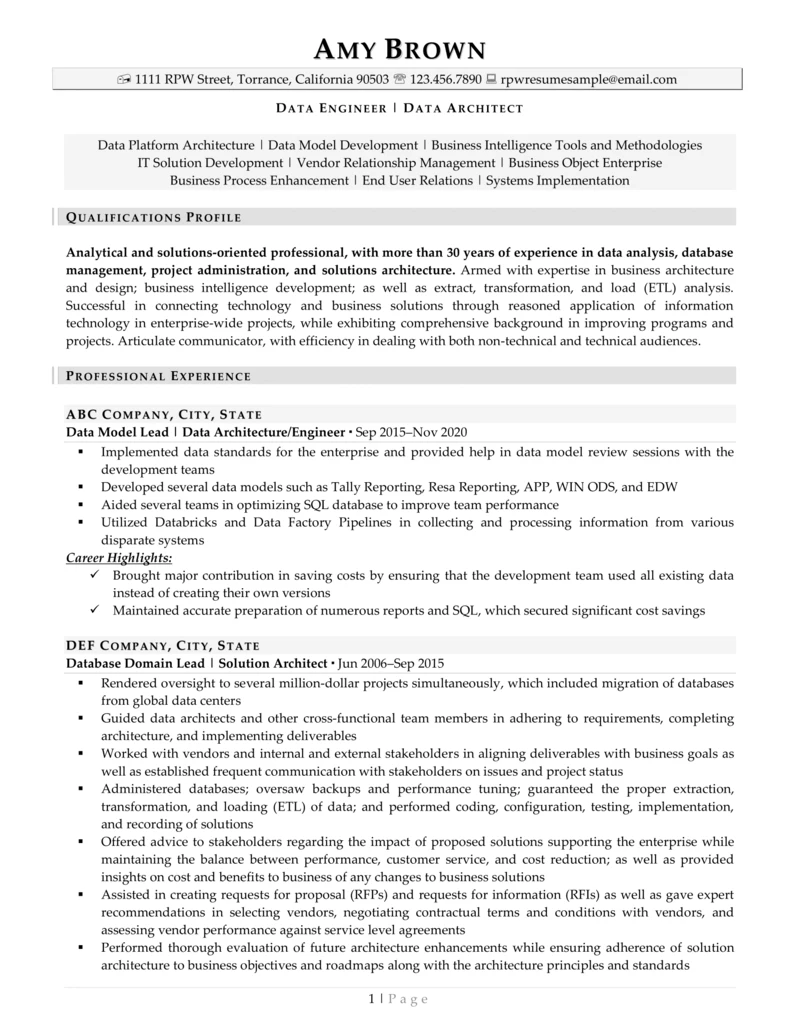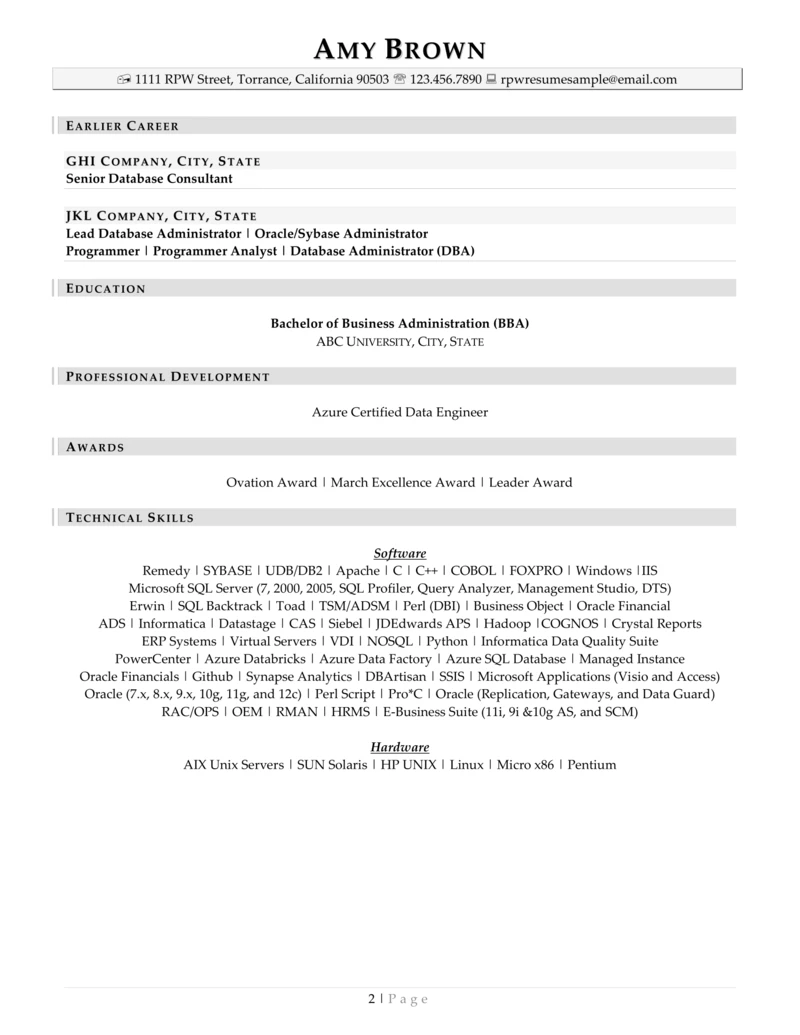In terms of growing job opportunities, the prospects of data engineering jobs are better than other careers in the industry. Along with data scientists and software engineers, data engineers are listed as one of the top emerging professions in the data science industry based on the projected growth rate by the United States Bureau of Labor Statistics.
Data engineers are in demand largely due to their in-demand expertise in creating data-storing architectures and data-processing systems that enable simpler access and interpretation of data in a business context. In addition to being an in-demand role, data engineering is also a well-paying career. In fact, the average salary of a data engineer in the US is $93,572 according to Payscale. So if you are planning for a career change, a data engineer position is a good to start a new career path.
Having said all that, in order to land this position, it is highly recommended that you equip yourself with an impressive data engineer resume. Thus, in this article, you will discover the fundamentals of being a data engineer, as well as what to put on your resume and tips on how to write a striking resume that will make you stand out from the competition.
What is a Data Engineer?
Data engineers are vital members of organizations who take charge of bringing data together from different source systems and making data easily accessible. They are also tasked with building data collection pipelines and have provided significant contributions to tightening information security and protecting any business from cyberattacks.
Moreover, a data engineer post is a highly technical position that requires a wide understanding of big data frameworks, machine learning, networking protocols, analytics tools, and more. Thus, it is important that they have hands-on exposure to SQL and NoSQL databases, cloud computing platforms, and parallel processing tools such as Apache’s Hadoop and Spark, along with different programming languages such as JavaScript, Python, and Scala.
What are the Duties of a Data Engineer?
The primary responsibility of a data engineer is to ensure that data is readily available, secure, and accessible to data scientists and other consumers. Nonetheless, their functions may vary depending on the company’s needs. Check and review these additional data engineer duties and assess your qualifications if you are fit for this job:
- Prepare, handle, and supervise efficient data pipeline architectures.
- Focus on analyzing and interpreting large data sets.
- Create algorithms for data storage, data collection, data accessibility, data quality checks, and data analytics with assigned teams.
- Work closely with data scientists to build the infrastructure needed to enhance internal operations.
- Build effective extract, transformation, and load (ETL) data pipelines and tools for easier data access and interpretation by utilizing tools like SQL and Big Data technologies.
- Create solutions that emphasize operational effectiveness, data quality, and other data-descriptive features.

How Do You Become a Data Engineer?
Pursuing formal education such as a bachelor’s or master’s degree in computer science, software engineering and IT, or data science and analytics is always the best choice to start a successful career as a data engineer. Nevertheless, beyond getting your degree, there are many other steps you can take to position yourself for success as a data engineer. These include the following:
- Apply for an entry-level data engineering position and advance professionally.
- Spend two or more years working in the field of analytics using data analysis software and programming languages such as R, Python, and C++.
- Start learning about data management, data systems architecture, and the data mining process.
- Build a portfolio of data engineering projects.
- Pursue additional certifications or professional-level courses.
What to Include in Your Data Engineer Resume
Knowing which sections to include in your data engineer resume will help you make it more appealing to hiring managers. Having a thorough understanding of each section will also enable you to convey your information in a way that will stand out to hiring managers. Finally, in order to beat the applicant tracking systems (ATS), you need to make sure that your resume always contains the standard sections and key components listed below:
Contact Information
Add your personal details, including your full name, along with your complete mailing address, email, and contact number. It’s also a good idea to include the URL of your LinkedIn profile or professional website. Using these details, hiring managers can contact you if they believe you’d be a good fit for their organization.
Specific Target Job Position
Hiring managers want to see your skills and experience, but she also wants to see that you are considering a specific position, though. To make it easier for hiring managers to understand what position you are applying for, include the desired job title as often as you can.
Qualifications Profile
Qualifications Profile or resume summary is a section that usually appears at the top of your resume and is made up of three to five concise sentences that succinctly describe your qualifications. Apart from your work history, this is also the most read section of the resume. So in order to be considered for the position of data engineer, be sure to highlight your qualifications, experiences, skills, and noteworthy accomplishments in this section.
Expert Tip:
Never include a resume objective. Remember that today’s recruiters prefer summary statements over resume objectives because they make hiring decisions based on candidates’ skills and work history rather than their career aspirations.
Areas of Expertise
The skills section of your resume is equally as significant as the summary statement and target position. Employers can get a quick overview of your most professional skills and industry keywords that relate to the job posting in this section. For this reason, your resume skills section must reflect the appropriate job skillset in order for you to be considered for the position.
Some of the skills you should list on your data engineer resume to succeed in your job search are listed below.
Hard Skills
- Big Data analytics
- Data processing and warehousing
- Machine learning
- Data Platform Architecture
- Data Model Development
- Business Intelligence Tools and Methodologies
- Systems Implementation
- Cybersecurity
- Data Pipeline Development
- ETL analysis
- Cloud Computing
Technical Skills
- JavaScript
- Python
- Scala
- Kafka
- NoSQL
- C and C++
- Java
- SQL
- R
- Hadoop
- Informatica Data Quality Suite
- Azure Databricks
- Azure Data Factory
- Azure SQL Database
Soft Skills
- Creative thinking
- Decision making
- Problem solving
- Leadership and teamwork
- Time management
- Research Skill
Related Article:
8 Essential Job Skills to Include in Your Resume
Work Experience
One of the most important and significant sections on a resume is your work experience. Why? Hiring managers frequently evaluate your potential and capabilities in this section in light of the outcomes you were responsible for at your previous employer. Additionally, the information in your work experience section helps recruiters decide if your roles and responsibilities align with the job description.
Expert Tip:
Don’t just list your job responsibilities next to each job entry. Instead, make sure the majority of your bullet points highlight outstanding accomplishments from prior positions. When possible, quantify your accomplishments for the hiring manager by including metrics, data, and statistics.
Education
Due to the high level of competition in the job market, recruiters only shortlist the best candidates. To add more value to your professional experience, keep yourself in the lead by providing the specifics of your educational background. Mention your educational background to help recruiters see you as a candidate who fits the criteria for the data engineering job profile.
Professional Development
Training, licenses, and certifications are all useful ways to show prospective employers your level of expertise. If you possess Azure Certified Data Engineer, AWS Data Engineer, Google Data Engineer, Certified Analytics Professional, or Cloudera Certifications, be sure to mention them on your data engineer resume.
Optional Sections for Your Data Engineer Resume
In addition to the sections mentioned above, you might think about including other significant information to increase your chances of getting the job over other applicants, including professional affiliations, activities, awards, and project sections.

How to Write Your Data Engineer Resume
By now, you should be familiar with the information that must be included on a data engineer resume. It’s time to put them to use and begin creating your own resume. We’ve outlined some resume trends and crucial steps you must take to create a top-notch data engineer resume.
1. Use simple yet professional design and layout.
Prior to even reading your resume, hiring managers frequently examine its format and presentation. As much as possible, try to create an ATS-friendly layout and give yourself a competitive edge on the job market by refraining from using ornamental designs, excessive borders, and fancy font styles.
2. Choose the right format for your needs.
The best resume format can direct recruiters’ attention to the areas you want them to go and highlight your strengths relevant to the position you’re applying for. So be sure to select a format that highlights your best traits. You can choose to write a chronological, functional, targeted, or a combination resume.
3. Show recruiters that you have the skills they’re looking for.
Your resume should be as specific and succinct as possible when describing your data engineer skills. To make it easier to read, place your skills section at the top of the document or group industry-specific skills into bulleted sections.
4. Use keywords and action verbs to describe skills, jobs, or achievements.
You can emphasize the tasks you are capable of performing and completing by using powerful action verbs. You can also convince potential employers and improve your chances of getting an interview by using industry-specific keywords.
5. Review, proofread, and edit.
Don’t forget to give your data engineer resume a thorough review before sending it to your target employer and other job posting websites. By doing this, you’ll be able to identify and fix typos, inconsistencies, and grammatical errors.
Data Engineer Resume Example
Do you want to see a solid resume for a data engineer job? Check out this resume sample, which was written by one of our expert resume writers, as a model when writing your own resume.


Note: For more ideas, you can check out our other information technology resume examples.
Have Your Data Engineer Resume Written by Our Experts!
Getting a job as data engineer can be tough. Due to the industry’s significant growth, there is considerable competition in the job market. But worry no more—thanks to career experts and expert resume writers, finding work in this field is made easy. With their expertise and knowledge in the field, they’re capable of writing job-winning resumes that can beat the ATS and impress hiring managers.
Resume Professional Writers provides free resume review and top-notch resume writing services to help you quickly land your dream job and receive interview calls. Get assistance with your job search from our team of seasoned writers and career coaches. Get in touch with us right away and let’s work together to snag your job search!








